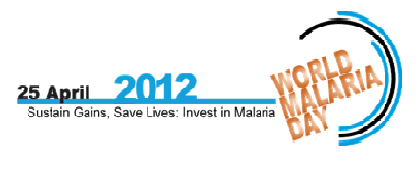Malaria is caused by a parasite called Plasmodium, which is transmitted via the bites of infected mosquitoes. In the human body, the parasites multiply in the liver, and then infect red blood cells.
Symptoms of malaria include fever, headache, and vomiting, and usually appear between 10 and 15 days after the mosquito bite. If not treated, malaria can quickly become life-threatening by disrupting the blood supply to vital organs. In many parts of the world, the parasites have developed resistance to a number of malaria medicines.
The world celebrates the World Malaria Day every year on April 25th, 2012. This year's Day is held under the theme: “Sustain Gains, Save Lives: Invest in Malaria”. Key interventions to control malaria include: prompt and effective treatment with artemisinin-based combination therapies; use of insecticidal nets by people at risk; and indoor residual spraying with insecticide to control the vector mosquitoes.
Malaria Epidemiological Status:
On the International Scale:
According to the World Malaria Report 2010, there were 225 million cases of malaria and an estimated 781,000 deaths in 2009, a decrease from 233 million cases and 985,000 deaths in 2000. Most deaths occur among children living in Africa where a child dies every minute from malaria. It is estimated that malaria is the cause of 20 per cent of deaths among children.
On the Local Scale:
In 2011, a number of 2788 malaria cases were recorded in the Kingdom of Saudi Arabia, out of which 69 cases are Saudis (2.4 per cent of the total malaria cases. This percentage corresponds to the incidence: 440 cases for every 100.000 persons. Saudi cases have been recorded in Jazan Region and Assir Region (59 cases in Jazan Region and 9 cases in Assir Region), in addition to one case in Al-Qunfudah Region.
Internationally Approved Date: 25/4/2012.
Locally Approved Date: 4/6/1433H.
Theme:
“Sustain Gains, Save Lives: Invest in Malaria”
Targeted Groups:
Major Health Messages:
Ensuring the highest level of political support for the Malaria Eradication National Program.
Strengthening coordination between the relevant health sectors meant to eradicate malaria.
Raising health awareness among citizens with regard to malaria and other vector-transmitted diseases, to ensure an effective societal participation.
Showing the current situation of malaria, the objective of the Eradication Program, as well as shedding light on the National Strategy and the challenges impeding putting the program into effect.
Displaying the Integrated Vector Control Strategy.
Ensuring effective involvement of the private sector.
Logo:

Related Links: